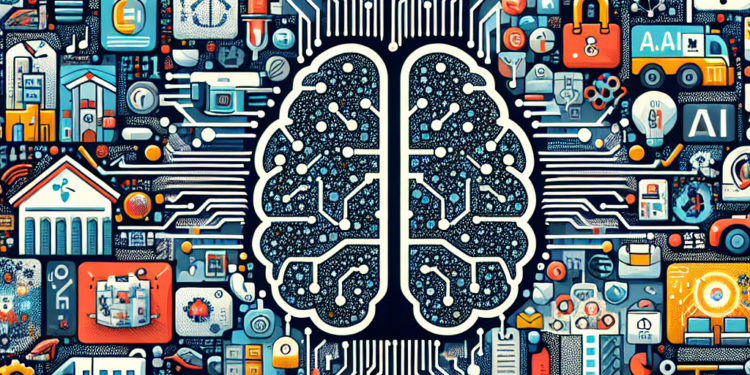Artificial Intelligence (AI) has been permeating various industries in recent years, transforming the way businesses operate and enhancing their capabilities. From healthcare to finance to transportation, AI has shown its potential to revolutionize traditional practices and drive innovation. In this article, we will explore some of the most impactful AI success stories across different sectors, showcasing how this technology is reshaping industries worldwide.
One of the most prominent industries to benefit from AI is healthcare. AI has the potential to significantly improve patient care, diagnosis accuracy, and treatment outcomes. For example, IBM’s Watson for Oncology is an AI-powered platform that assists oncologists in cancer treatment decision-making. By analyzing patient data and medical literature, Watson can recommend personalized treatment plans based on the latest research and best practices. This not only helps doctors make better-informed decisions but also allows them to provide more customized care to their patients.
Another AI success story in healthcare is the use of machine learning algorithms to predict patient outcomes and prevent potential health issues. In a study published in the journal Nature Medicine, researchers from Google Health demonstrated the ability of AI to predict patient outcomes such as the likelihood of hospital readmission, length of stay, and mortality risk. By analyzing electronic health records and other data sources, the AI model was able to identify high-risk patients early on, enabling healthcare providers to intervene and improve patient outcomes.
In the financial sector, AI is also making a significant impact by enhancing decision-making processes and risk management. For example, JPMorgan Chase uses AI-powered algorithms to analyze vast amounts of data and detect fraudulent activities in real-time. This has helped the bank prevent millions of dollars in fraudulent transactions and protect its customers from financial loss. AI is also being used to optimize trading strategies, automate customer service, and personalize financial advice based on individual preferences and needs.
In the transportation industry, AI is revolutionizing the way we travel and commute. Autonomous vehicles, powered by AI algorithms, are becoming a reality, with companies like Tesla, Google, and Uber leading the way in developing self-driving cars. These vehicles use AI technologies such as computer vision, machine learning, and sensor fusion to navigate roads, interpret traffic conditions, and make real-time driving decisions. By eliminating the need for human drivers, autonomous vehicles have the potential to reduce accidents, improve traffic flow, and enhance transportation efficiency.
AI is also transforming the retail industry by enabling personalized shopping experiences, enhancing supply chain management, and optimizing inventory management. For example, Amazon uses AI algorithms to recommend products to customers based on their browsing history and purchase behavior. This not only helps customers discover new products but also increases sales and customer satisfaction. AI is also being used to forecast demand, optimize pricing, and streamline warehouse operations, allowing retailers to reduce costs, improve efficiency, and stay competitive in the ever-evolving market.
In the manufacturing sector, AI is driving automation, efficiency, and productivity improvements. Companies like Siemens, GE, and Bosch are using AI-powered technologies to optimize production processes, monitor equipment performance, and predict maintenance needs. This has enabled manufacturers to reduce downtime, increase output, and improve product quality. AI is also being used to enhance product design, facilitate real-time quality control, and enable predictive maintenance, helping manufacturers stay ahead of the curve and meet the demands of today’s fast-paced market.
In the energy sector, AI is being used to optimize energy consumption, enhance grid efficiency, and reduce carbon emissions. Smart grids, powered by AI algorithms, enable utilities to monitor energy usage, balance supply and demand, and integrate renewable energy sources into the grid. This allows for better energy management, lower costs, and reduced environmental impact. AI is also being used to optimize power generation, predict equipment failures, and improve energy efficiency, helping companies meet regulatory requirements and achieve sustainability goals.
In the entertainment industry, AI is revolutionizing content creation, distribution, and personalization. Streaming platforms like Netflix and Spotify use AI algorithms to recommend movies, TV shows, and music based on individual preferences and viewing habits. This not only helps users discover new content but also increases engagement and retention. AI is also being used to automate content production, enhance visual effects, and enable virtual reality experiences, creating immersive and interactive entertainment experiences for audiences worldwide.
In conclusion, AI has the potential to transform industries and revolutionize the way businesses operate. From healthcare to finance to transportation, AI is reshaping traditional practices, driving innovation, and unlocking new opportunities for businesses worldwide. By harnessing the power of AI technologies, companies can improve decision-making processes, enhance customer experiences, and drive growth and success in today’s competitive market. As AI continues to evolve and mature, we can expect to see even more transformative success stories across various sectors, further demonstrating the limitless potential of this groundbreaking technology.













